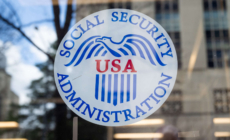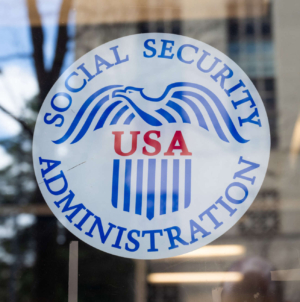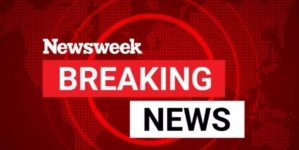-
Americans Filing for Social Security Surges to Record High Amid Cut Fears - 10 mins ago
-
With Aaron Rodgers, where do Steelers stand in AFC pecking order? - 13 mins ago
-
Torrance boy, 9, detained by ICE for planned deportation to Honduras; community outraged - 29 mins ago
-
Florida man convicted in 2004 cold case death of victim whose remains have not been found - 40 mins ago
-
‘Cheers’ actor George Wendt’s death linked to heart conditions - 42 mins ago
-
Musk On If Trump Should Be Impeached: ‘Yes’ - 49 mins ago
-
FOX Super 6 contest: Chris ‘The Bear’ Fallica’s Belmont Stakes picks - 56 mins ago
-
Prison for Instagram? L.A. authorities target street racing influencer - about 1 hour ago
-
Tesla stock price plunges as Trump suggests stripping Elon Musk’s companies of federal contracts - about 1 hour ago
-
Man sentenced for fatally severing the spine of ex-girlfriend’s 2-year-old daughter - about 1 hour ago
Donald Trump Predicts GOP Comeback in Deep-Blue State
President Donald Trump expressed confidence in a Republican resurgence in New Jersey during a recent rally, claiming that the deep-blue state is ripe for political change.
“New Jersey is ready to pop out of that blue horror show and really get in there and vote for somebody that’s going to make things happen,” the president said during a telephone rally for Republican gubernatorial candidate Jack Ciattarelli on Monday.
The Republicans have not won a gubernatorial election in New Jersey since 2013. The last time the GOP won a presidential election in New Jersey was 1988.
Why It Matters
Trump’s comments reflect his ongoing effort to expand Republican influence in areas long considered out of reach for the GOP. While New Jersey remains reliably blue in statewide and national elections, Republicans have seen increasing success in the state in recent years, with Trump increasing his vote share by 10 points in 2024.
Trump’s remarks appear to be an attempt to capitalize on that momentum, testing how far his political brand can stretch in the post-2024 landscape.
Julia Demaree Nikhinson/AP
What To Know
Trump made the prediction during a Monday evening telephone rally in support of Jack Ciattarelli—a former state lawmaker who once criticized Trump but is now one of his most vocal allies. In the 10-minute call, Trump warned voters that under continued Democratic leadership, New Jersey risks remaining a “high-tax, high-crime sanctuary state.”
Ciattarelli, positioning himself as the candidate to lead a GOP resurgence, outlined a hard-line conservative agenda. He pledged that his first executive order as governor would be to end any sanctuary policies protecting immigrants lacking permanent legal status. Currently, the state attorney general has directed local law enforcement agencies not to assist federal authorities in civil immigration enforcement.
While there is no formal legal definition of sanctuary policies, the term generally refers to local jurisdictions limiting cooperation with federal immigration officers.
Ciattarelli also vowed that the attorney general he appoints, if elected, would refrain from filing lawsuits against the White House. This marks a stark contrast to New Jersey’s current attorney general, who has mounted several high-profile legal challenges to Trump-era policies—including a lawsuit opposing Trump’s attempt to eliminate birthright citizenship.
Ciattarelli faces several challengers in the Republican primary: former radio host Bill Spadea, state Senator Jon Bramnick, former Englewood Cliffs Mayor Mario Kranjac and South Jersey contractor Justin Barbera.
Although the GOP primary is still underway, Ciattarelli has begun previewing his likely message against a Democratic opponent in the general election, saying the party’s eight years in the governor’s office and more than two decades of legislative control have been a failure.
The Democratic field remains unsettled, with six candidates vying for the nomination: U.S. Representatives Josh Gottheimer and Mikie Sherrill; Newark Mayor Ras Baraka; Jersey City Mayor Steven Fulop; former state Senate President Steve Sweeney; and Sean Spiller, president of the New Jersey Education Association.
Despite New Jersey’s strong Democratic leanings—particularly in presidential and Senate elections—the state has a history of swinging between parties in gubernatorial races. Democrats currently hold a voter registration edge of roughly 800,000 over Republicans, but independents make up a crucial share of the electorate.
Recent polling suggests Trump maintains an unexpectedly strong foothold in the Garden State. According to an Emerson College/PIX11/The Hill poll, conducted between May 11-13 among 1,000 New Jersey registered voters, Trump is more popular than Democratic Governor Phil Murphy, who holds a 40 percent job approval rating, with 45 percent of voters disapproving and 15 percent neutral.
In the poll, Trump had a 47 percent approval rating, up from 38 percent in July 2020.
Governor Murphy’s dealings with Trump have combined sharp criticism with occasional cooperation. He has condemned the president’s 2025 push to dismantle the Department of Education as “unconscionable and unconstitutional” and taken action to shield abortion rights in New Jersey. Yet he has also acknowledged shared interests, including working with Trump to oppose New York City’s congestion pricing plan, which would have impacted New Jersey commuters.
The Emerson poll also highlighted a broader political divide among voters. While Democrats overwhelmingly support a governor who would push back against Trump, most independents (60 percent and Republicans (90 percent)—and 53 percent of voters overall—prefer a leader who would cooperate with the Trump administration. That desire for collaboration among swing voters may help explain Trump’s enduring influence in a state long considered out of reach for Republicans.
What Happens Next
Early in-person voting begins for New Jersey’s gubernatorial election on Tuesday and will last until Sunday. Primary elections will take place on June 10.
Source link





























